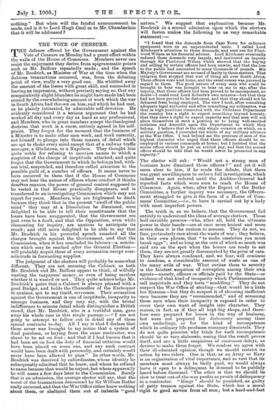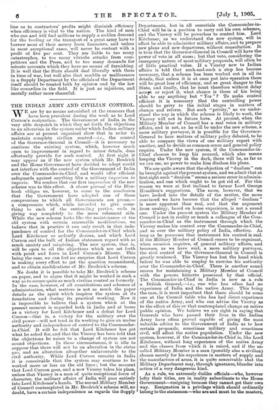T HE defence offered by the Government against the Vote of
Censure on Monday had a great effect within the walls of the House of Commons. Members never can resist the enjoyment they derive from epigrammatic points such as Mr. Balfour repeatedly made ; and the speech of Mr. Brodrick, as Minister of War at the time when the dubious transactions occurred, was, from the debating point of view, really a very good one. He whittled away the amount of the losses with great skill, and succeeded in leaving an impression, without precisely saying so, that any comparatively slight blunders he might have made had been caused by the overwhelming amount of work which the war in South Africa had thrown on him, and which he had met, as he plainly intimated, by admirable self-devotion. He evidently considered it a serious argument that he had worked all day and every day as hard as any professional, and Members, who in great numbers accept the theological doctrine that work is a curse, entirely agreed in his self- praise. They forgot for the moment that the business of a Minister is to make other men work, and work correctly, not himself to plunge into those masses of detail which are apt to choke every mind except that of a railway traffic manager, a Gladstone, or a Napoleon. They thought him quite noble for refusing to mention names to which a suspicion of the charge of ineptitude attached, and quite forgot that the Government to which he belongs had, with- out trial, suspended, and therefore called attention to the possible guilt of, a number of officers. It seems never to have occurred to them that if the House of Commons may not hear the names of officers whose conduct it thinks desePres censure, the power of general control supposed to be vested in that House practically disappears, and is transferred to an investigating Commission which may not report for years. Members, who are frightened to death because they think that in the present "swell of the public mind" they may at a Dissolution be dismissed, were delighted to be able to tell their constituents that the losses have been exaggerated, that the Government are just even to a fault, and that the Opposition, even while clamouring for inquiry, are anxious to anticipate its result; and still more delighted to be able to say that Mr. Brodrick in his powerful speech smashed all the charges brought against the Government, and that the Commission, when it has concluded its labours—a conclu- sion which may be reached after the General Election— will probably acquit them of every accusation except over- solicitude in forwarding supplies.
The judgment of the electors will probably be somewhat different. They are not accusing the Cabinet, as both Mr. Brodrick and Mr. Balfour appear to think, of wilfully wasting the taxpayers' money, or even of being careless 'whether it is wasted or not. They quite acknowledge Mr. Brod.rick's point that a Cabinet is always pleased with a good Budget, and holds the Chancellor of the Exchequer in anxious, not to say timid, reverence. Their accusation against the Government is one of ineptitude, incapacity to manage business, and they may say, with the brutal indifference to minute detail which distinguishes a British crowd, that Mr. Brodrick, who is a truthful man, gave away his whole case in this single passage :—" I am not going to attempt to follow out in detail any of these special contracts to-day. All I say is that I declare that there never was brought to my notice that a system of dual purchase, or buying from the same contractor, was about to be set on foot ; and that if I bad known that it had been set on foot the duty of financial criticism would have been placed on some one, and any such contract would have been dealt with personally, and certainly would never have been allowed to pass." In other words, Mr. Brodrick was deceived by subordinates, whose identity he subsequently admitted that he knew, and whom he refused to name because that would be unjust, but whom apparently he will name a few days later to the Commission. Surely that is an admission, the average elector will say, that the worst of the transactions denounced by Sir William Butler really occurred, and thattheMar Office either knew nothing. about them, or sheltered them out of imbecile "good nature." We suggest that explanation because Mr. Brodrick in a second admission upon which the electors will fasten makes the following to us very remarkable statement :— "I found that the demands from Cape Town for ordnance equipment were on an unprecedented scale. I called Lord Kitchener's attention to these demands, and sent out Sir Fleet- wood Wilson as his financial adviser. Lord Kitchener eventually; reduced these demands very largely, and instituted an inquiry through Sir Fleetwood Wilson which showed that the buying and selling by certain officers had been unwise, and that the loss to the public had amounted to many thousands of pounds. Kis Majesty's Government are accused of laxity in these matters. That telegram first stopped that sort of thing all over South Africa. These officers were sent home, and the usual course was pursued in regard to them. The good nature of every man who could be brought to bear was brought to bear on me to say, after the inquiry, that these officers had been proved to be incompetent, no doubt—I could read Lord Roberts's own minutes—but that they had not been proved to be dishonest, and that they should not be debarred from being employed. The view I took, after consulting adequate legal authority and after consulting my colleagues, was that in high positions connected with the Ordnance Department the country has a right to expect something beyond honesty, that they have a right to expect capacity and that men will not place themselves in such a position as to bring well-merited criticism and discredit upon the Department to which they belong. I believe that is the only single occasion on which, on a military question, I overruled the whole of my military advisers at the War Office. I had behind me the pressure of men of the highest character who urged that these officers should be re- employed in various commands at home; but I insisted that the senior officer should be put on retired pay, and that the second officer should be told that he would never be promoted in any capacity."
The elector will ask : "Would not a strong man of business have dismissed those officers ? " and yet it will seem clear to him, if he reads the debate, that there was great unwillingness to order a full investigation, which indeed was not ordered until the Auditor-General had reported facts which were sure to reach the House of Commons. Again, when, after the Report of the Butler Committee, a further inquiry was necessary, the G8vem- ment struggled to give it the form of a House of Corn-. mons' Committee,—i.e., to have it carried out by a body with most imperfect powers.
The truth is, as we believe, that the Government fail entirely to understand the ideas of average electors. Those half-invisible persons—who, after all, hold the ultimate power in their hands—are at once more lenient and more severe than it is the custom to assume. They do not, we fear, particularly care about the waste of war ; they believe, in their own phrase, that "to make omelettes you must break eggs"; and so long as the oats of which so much was said are on the spot when the horses are ready to eat them, they are not greatly disconcerted by the price of oats. They have always condoned, and, we fear, will continue to condone, a considerable amount of waste as one of the many evils of war. 'What excites them to severity is the faintest suspicion of corruption among their own agents—namely, officers or officials paid by the State—or evidence of that kind of incapacity which Parliamentarians call ineptitude and they term "muddling." They do not suspect the War Office of stealing—that would be a little too Russian—but they do suspect it of choosing inefficient men because they are "recommended," and of screening those men when their incapacity is exposed in order to cover their own want of insight into character. They reason; in fact, as if they all kept big shops, and there- fore were prepared for losses in the way of business, but were not prepared for dishonesty among their own underlings, or for the kind of incompetence which in ordinary life produces summary dismissals. They do not quite perceive why trials for such incompetence should be so very elaborate, seeing that the result proves itself, and are a little suspicious of enormous delays, as devices to make them forget. We confess we agree with their ill-educated opinion, though we should restrict its action by two riders. One is that, as an Army or Navy is an organisation of vital importance, and so vast that its members must always be badly paid, we would always leave it open to a delinquent to demand to be publicly heard before dismissal. The other is that we should be slow to treat out-of-the-way profits as proofs of delinquency in a contractor. " Rings " should be punished, as guilty of petty treason against the State, which has a moral right to good service from all men; but a hard-and-fast line as to contractors' profits might diminish efficiency when efficiency is vital to the nation. The kind of men who can and will find millions to supply a sudden demand for the feeding or the transport of a great army have to borrow most of their money from financiers, and unless in most exceptional cases, will never be content with a profit of five per cent. They are liable to too many catastrophes, to too many vitriolic attacks from com- petitors and the Press, and to too many demands for minute accounts which they have no means of furnishing. It is well that the State should deal liberally with them in time of war, but well also that muddle or malfeasance in a Supply Department by the officials of the Department itself should be treated both by opinion and by the law like cowardice in the field. It is just as injurious, and morally rather more shameful.











































 Previous page
Previous page